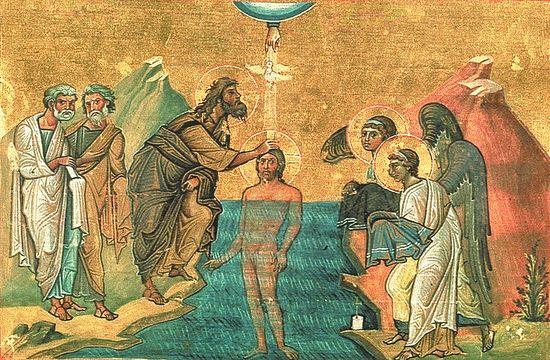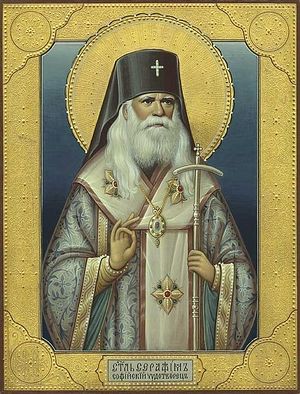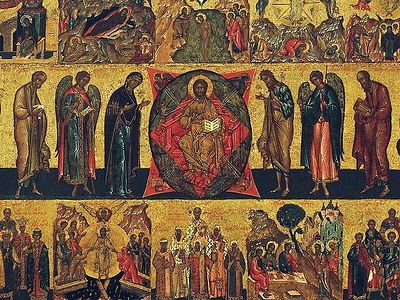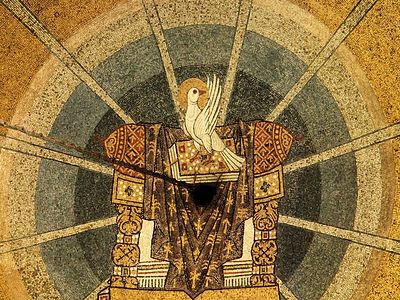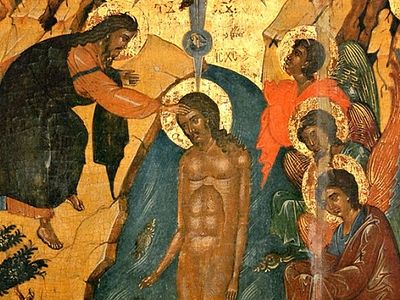Here are the words of the Epistle reading for the great feast of the Baptism of the Lord, to which I would like to draw your attention for a moment, beloved brothers and sisters in Christ. Here it speaks of the manifestation of grace, which, according to the teaching of Apostle Paul, makes us chaste, righteous, and pious; that is, holy. What is this grace of which the apostle speaks here, as a means for acquiring the holy and salvific life? According to the teaching of St. John Cassian, we must distinguish two types of grace: grace in the external sense, through which the Lord acts throughout the whole world whether directly, or by means of angels, people, and even visible nature; and grace as an inner Divine strength. Precisely this latter grace we must understand in the given words of the holy apostle. It acted in the life of the first people in paradise and was the source of their proper conduct, holiness, and blessedness. After our progenitors’ fall it left them, and it was needful that the Savior become incarnate, suffer, die, and resurrect that this grace would again be given to people. This mercy of God was poured out upon us when, according to the promise of Christ, the Holy Spirit descended upon the apostles in His manifold grace, as truth (Jn. 1:5, 26; 5:6; 16:13), as power (Acts 1:8), and as comfort (Jn. 14:16, 26; 15:26; 16:7), or as Divine joy. Since then the grace of the Holy Spirit has been granted to believers in the Church through the mystery of Baptism and Chrismation for the renewal of the mind, will, and heart.
As revivifying Divine power, it begins to reign within our being, in the very heart of man. Until the appearance of this grace, as teaches Blessed Diadochus, great among the holy fathers, in the heart reigned sin, grace acting from without. But after the appearance of this grace, sin acts on a man from without, but grace from within the heart. In this, incidentally, lies the difference between the Old and New Testaments.
Of course, we will never define what the grace of God is in essence. St. Macarius the Great teaches that as God is incomprehensible in His essence, so we cannot know in its essence the grace of the Holy Spirit, for it is inseparable from God as His Divine power. This is why the Lord Himself, offering the teaching on grace as the work of the Holy Spirit, invoked elemental forms. He had it in mind, as St. Symeon the New Theologian says, when He said: I am come to send fire on the earth; and what will I, if it be already kindled? (Lk. 12:49). The same grace of the Holy Spirit the Lord had in mind when on the final great day of the feast He proclaimed: If any man thirst, let him come unto Me, and drink. He that believeth on Me, as the scripture hath said, out of his belly shall flow rivers of living water. But this spake He, the Evangelist notes, of the Spirit, Which they that believe on Him should receive (Jn. 7:37-39).
However, we can know the grace of the Holy Spirit experientially, spiritually, when we experience in our hearts its salvific working, perceiving from it the truth about God, and about the world, feeling within ourselves its strength for battling sin and its ineffable joy. We will know what is the grace of the Holy Spirit only then when it will be reigning within us over all our passions, and we will feel it, as the Kingdom of God, as truth, peace, and the joy of the Holy Spirit (Rom. 14:17).
Precisely such experiential knowledge of grace has been left to us in the works of the holy fathers of the Church: St. Anthony the Great, St. Macarius the Great, Blessed Diadochus, St. Symeon the New Theologian, and the great theologian of our Russian Church St. Theophan the Recluse. They felt the grace of the Holy Spirit within themselves, as a gift of Divine guidance and wisdom, so that others might be illuminated with the grace of Divine truth. They felt grace within themselves, as Divine strength, for by it they performed wondrous miracles, and by it they foretold the future. This grace was experienced by them as an unquenchable inner Divine joy, which they experienced continually and by which they comforted the sorrowful hearts of the faithful.
It is clear from here, what a great blessing the grace of the Holy Spirit is for us, that it is the most precious treasure, about which testifies the teaching of Christ, the apostles, and the holy fathers. According to the teaching of Christ, the grace of the Holy Spirit is the greatest blessing for us, and sending it down to us was the purpose of His suffering and death, as is clear from His final conversation with His disciples (Jn. 16:7). So the holy apostles looked upon grace, for the teaching of salvation by grace, by virtue of the crucifixion of Christ, was central to their Gospel, to which the epistles of the holy apostle Paul testify especially clearly. The holy fathers of the Church could not look upon grace otherwise. Thus, St. Symeon the New Theologian says: “This was the goal and end of the entire dispensation of Christ, that the faithful would receive within their souls the Holy Spirit and that He would be as the soul of our soul and that by the work of this Spirit we would be refined and renewed in mind, conscience, and all the senses.” And the great God-pleaser of our Russian Orthodox Church, St. Seraphim of Sarov taught that the acquisition of the Holy Spirit (i. e. its uncovering within us) is the purpose of the whole of our Christian life.
This is what the words of the apostle Paul, heard by us today in the Liturgy, say about the manifestation of such grace.
What, beloved, should we extract here for a salvific lesson for ourselves? Hearing these apostolic words, we should rejoice and thank God that we are children of the Orthodox Church of Christ, through which the Lord gives us this great grace, unmatched by any treasure in the world. In Catholicism there is no such grace; more properly, it cannot manifest itself among Catholics, because of their deviation from the truths of the Orthodox faith. In this lies the most essential difference between Orthodoxy and Catholicism. In the latter this grace, received in the mysteries of holy Baptism and Chrismation, is like a Divine spark hidden under the ashes of various heresies, but in our Orthodox Church it shines as the sun, revealing itself in the wondrous and diverse talents which the Lord grants His holy ones, having fulfilled His word in their lives: He has magnified all His pleasure in them (Ps. 15:3).
As concerns the Protestants, here there absolutely is no regenerating grace of the Holy Spirit in its wondrous manifestations, for Protestantism does not have the mystery of Chrismation, in which is granted to us the grace-filled strength to become new creatures in Christ.
However, we must not only rejoice that we are children of the Orthodox Church, receiving from it this great grace; but we must unveil this grace in our lives, unto its wondrous manifestations. And this will come to pass only when we will steadily fulfill all the Divine commandments. Therefore let the words of Apostle Paul, heard by us in the Liturgy today, awaken in us not only a feeling of joy, but also the desire to realize this in our lives. Then the grace of the Holy Spirit will teach us the salvific, chaste, and holy life, and to us will be fully suitable the words of the apostle Paul: For the grace of God that bringeth salvation hath appeared to all men, teaching us that, denying ungodliness and worldly lusts, we should live soberly, righteously, and godly, in this present world (Tit. 2:11-12). Amen.
Delivered in the Russian embassy church of St. Nicholas in Sophia, January 6, 1924
From: Archbishop Seraphim (Sobolev). Homilies (Sophia, 1944), pp. 17-20 (in Russian).
